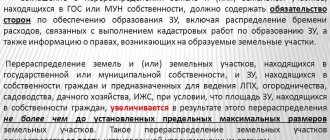What is property rights
Land plots are the property of the state, municipalities or private individuals. Used according to intended purpose.
What is land ownership and how does it arise? What types and forms exist?
What is the basis of ownership and are there other property rights and what types of documents confirm ownership? We will discuss it in detail in this article.
How to register ownership of a land plot - video.
Legislative regulation
Legal relations in the field of property rights are regulated by the Civil and Land Codes. Article 25 of the Land Code states that the right of ownership arises on the grounds developed by civil and federal legislation. The right of property and other property rights are regulated by Chapter 17 of the Civil Code of the Russian Federation.
Article 39.9 of the Land Code contains a list of persons who have the opportunity to register a plot for indefinite use. Article 274 of the Civil Code defines the concept of “servitude”. The list of documents certifying ownership of the plot is contained in Article 26 of the Land Code of the Russian Federation.
What is the basis of ownership
Possession is
the Right of Ownership - de facto possession of territory, physical control. This is the basis for the emergence of other powers - use and disposal.
Important! Ownership is confirmed officially by a title deed. The right of lifelong inheritable ownership concerns land plots owned by states or municipalities. It is provided to individuals.
as a right that includes three powers – ownership, use and disposal of land and other natural resources (Clause 2 of Article 36 of the Constitution of the Russian Federation).
The Civil Code of the Russian Federation (Part 1) dated November 30, 1994 No. 51-FZ (hereinafter referred to as the Civil Code of the Russian Federation) defines the grounds for the emergence and termination of rights to a plot of land, as to any other property. A set of norms of land law establishes the specifics of the emergence and termination of such rights, as well as the procedure for their registration.
The sources of land law are: Land Code of the Russian Federation of October 25, 2001 No. 136-FZ (hereinafter referred to as the Land Code of the Russian Federation), a number of federal laws; Ch. is devoted to issues of land ownership. III Land Code of the Russian Federation “Land Ownership” ; issues of the emergence of rights to land are discussed in Chapter. V Land Code of the Russian Federation “Emergence of rights to land ”.
In ch. XVII Civil Code of the Russian Federation “Property rights and other real rights to land” examines the grounds for the emergence of real rights. Among the real rights, the objects of which can be plots of land, are:
- Ownership rights (private, state, municipal) to a land plot arise either due to the acquisition of rights from another owner (transaction of alienation, exchange, donation, etc.), or through the formation of a new plot and subsequent registration of its ownership;
- Rights of use (rent, perpetual use, operational management, etc.);
- The right to perpetual use of land in federal or municipal ownership is granted to certain categories of legal entities (public authorities; budgetary, state and autonomous institutions of all levels); state-owned enterprises. Arises in connection with a decision of an authorized government body. The right of perpetual use, previously issued to individuals, remains valid, but such a right cannot be granted to citizens;
- The right of lifelong inheritable ownership is currently not granted in the Russian Federation, but existing rights are retained;
- The right of limited use (easement) arises from the terms of the transaction, a regulatory act of a public authority, or is associated with the special legal status of the land plot;
- Other rights of use (rent, etc.). They arise from the performance of legally significant actions (conclusion of an agreement, publication of a regulatory act of an authority).
Registration of ownership of a land plot - video.
Summary . Ownership of a land plot is the owner’s authority to own, use and dispose of it in his own interests.
Peculiarities:
- Not every memory can be private property. The list of territories is established by land legislation;
- The owner of the land must have legal capacity;
- When the plot is sold, the right passes to the buyer;
- The property must be obtained as a result of legal factors. If the land is not private or municipal property, it is recognized as state property.
State property - plots that do not belong to citizens, legal entities or municipalities.
Its subjects are:
- state;
- state-owned enterprises;
- institutions.
Grounds for re-registration of a land plot
The owner of real estate has the right to dispose of his property himself. Therefore, the transfer of property can occur on the following grounds:
- conclusion of a civil contract;
- as part of inheritance;
- as a result of privatization;
- by acquisitive prescription.
The most common option is to carry out civil transactions.
If there are buildings and structures on the site, the right to them must be re-registered along with the land.
Conclusion of an agreement
Any type of real estate transaction must be reflected in a written agreement, which can be concluded either on a paid or gratuitous basis.
Compensatory contracts include:
- buying and selling;
- rent;
- menu
When transferring rights to real estate free of charge, the best option is a gift agreement. If the property is re-registered for a certain period, then a free use agreement is concluded.
Contractual relations relating to land are regulated by chapters 30-32, 34, 36 of the Civil Code of the Russian Federation.
Inheritance
If the owner of the plot dies, then his property is inherited by his legal successors. The estate will include real estate that belonged to the testator under the right of ownership or lifelong inheritable ownership.
You should know! The assignee receives the right to the soil, artificial reservoirs and vegetation located on the site.
Inheritance is carried out according to a will. If it is absent, the inheritance is transferred to the legal successor according to the law, taking into account the norms of Section 5 of the Civil Code of the Russian Federation.
Privatization
By decision of the authorized bodies, state and municipal real estate can be transferred into the ownership of citizens free of charge as part of privatization.
Its rules are established by the provisions of Art. 39.1, 39.5, 39.10 of the Land Code of the Russian Federation, Federal Laws No. 178-FZ dated December 21, 2001, No. 119-FZ dated May 1, 2016.
Acquisitive prescription
A citizen has the right to acquire land by acquisitive prescription. If he has owned real estate in good faith, openly and continuously for 15 years and used it as personal property, he can register it as his own. The right of ownership on such grounds can be transferred to the copyright holder only by a court decision.
We must remember! Acquisitive prescription does not apply to state and municipal property.
Other real powers
In addition to property rights, there are others. This is a lifelong inheritable possession, perpetual use and easement.
Property rights have the following characteristics:
- are absolute - if there are other subjects besides the owner of the right, they should not interfere with him;
- arise in relation to individual lands;
- determined by the norms of the legislative branch.
All of them exist in parallel with the right of ownership.
Reference! A land plot is not transferred by the right of lifelong inheritable ownership, however, having received it, a citizen is allowed to register ownership of it.
Signs of such ownership:
- arises and acts in relation to state and municipal territories;
- lifetime ownership is available only to individuals - citizens of Russia;
- disposal of land is limited - it cannot be sold, donated or alienated.
Subject to compliance with urban planning requirements, the user will be allowed to erect buildings with further registration.
Ownership of land
An allotment can be registered for perpetual use by:
- authorities;
- government institutions;
- state, city enterprises;
- heritage centers of former Presidents.
Ownership is registered through free privatization. Before this, you cannot perform any actions with the memory.
Information! An easement is the limited powers of a citizen over neighboring land plots. It arises based on an agreement with the owner and must be registered. The purpose of using the territory is narrow and is specified in the agreement.
Required Documentation
Now we will talk in more detail about what documents are needed to re-register a land plot. But, before you start collecting them, you will have to clarify what rights you personally have in order to count on re-registration. And they arise if the area:
- has already been used before - it could be gratuitous use or lifetime ownership, which is inherited;
- acquired by purchase;
- received as a gift;
- received as an inheritance.
Each such case requires the following set of papers:
- a statement indicating the basis for possessing property rights;
- cadastral passport and copies of the cadastral plan of the plot;
- deed of gift, purchase and sale agreement, decision of the authorized body on the transfer of ownership of the plot and other document on the completed transaction;
- receipt of payment of the duty;
- document on acceptance and transfer signed by the parties to the transaction (this does not apply to land inheritance).
In special cases, this list may be supplemented.
| purchase and sale | the seller must confirm his ownership of the land being sold; present a civil passport (for an authorized person - a notarized power of attorney) |
| gift transaction | The donor will be required to provide a document confirming that he has ownership of the donated plot. |
| if the donor is married, his spouse must confirm his consent to the transaction | |
| inheritance | certificate of the testator's ownership of the inherited land |
| a will, and if there is no will, confirmation of close family ties with the deceased, and therefore of your right by law to inherit the entire plot or part of it | |
| change of land category | The owner of the land plot should prepare:
|
If the decision to receive a plot is made by an authorized body, all that is required is a basic set of documentation and the passport of the citizen in whose name the land is registered.
However, the registration procedure may well not be so simple. And this is due, first of all, to errors made in the documents. And if they were discovered in land surveying or shared property (of a large family or dozens of shareholders), then the dispute risks dragging on, and passions literally “boil” at court hearings.
So you will have to try to ensure that all documents are in order and completed in a timely manner.
Objects and subjects
Objects are lands that have become the property of a certain entity: legal entities or individuals, the state or municipality.
Subjects – persons recognized in accordance with the procedure established by law as the owners of a specific territory are:
- natural citizens (with and without citizenship, foreigners);
- legal (organizations);
- Russian Federation and its constituent entities;
- urban formations.
The object of land ownership is a land plot, the concept of which is enshrined in clause 3 of Art. 6 of the Land Code of the Russian Federation: this is an immovable thing, which is a part of the earth’s surface and has characteristics that make it possible to define it as an individually defined thing.
What is land ownership - video.
The content of property rights, which applies to any objects of civil rights, including land plots, is established by civil law. According to Art. 209 of the Civil Code of the Russian Federation, the owner has the rights to own, use and dispose of his property.
Ownership of a land plot represents possession of it as one’s own; for example, for a legal entity, this is the ability to list it on its balance sheet.
Using land is an opportunity to extract its beneficial properties: place buildings and structures on it, grow agricultural products, etc.
The power of disposal consists in the ability for the owner to determine the legal fate of the land plot. He has the right to alienate a land plot into the ownership of other persons (donate, sell, exchange, bequeath, transfer as a contribution to the authorized capital of commercial organizations, etc.), transfer to them, while remaining the owner, the rights of ownership, use and disposal of the plot, give it away as collateral, etc.
In accordance with Art. 209 of the Civil Code of the Russian Federation, the owner has the right, at his own discretion, to take any actions in relation to his property that do not contradict the law and other legal acts and do not violate the rights and interests protected by law of other persons. At the same time, the ownership, use and disposal of land and other natural resources, to the extent that their circulation is permitted by law, is carried out by their owner freely, if this does not cause damage to the environment and does not violate the rights and legitimate interests of other persons.
According to land legislation, land must be used in accordance with its intended purpose (determined by belonging to a particular category of land) and the permitted type of use.
The owner of a land plot must carry out measures to protect land, comply with the requirements of urban planning regulations, construction, environmental, sanitary and hygienic, fire safety and other rules and regulations when using land plots, prevent pollution, littering, degradation and deterioration of soil fertility on lands of the relevant categories, perform other duties provided for by the RF Land Code and other federal laws.
Participants in land relations (with subjects of land ownership ) in accordance with Art. 5 of the Land Code of the Russian Federation are: citizens, legal entities, the Russian Federation, constituent entities of the Russian Federation, municipalities. Paragraph 2 of this article determines that the rights of foreign citizens, stateless persons and foreign legal entities to acquire ownership of land plots are determined in accordance with the Code and federal laws.
The law also provides for restrictions in certain cases on the powers of the owner to dispose of a land plot. Yes, Art. 37 of the Land Code of the Russian Federation provides for special requirements for the procedure for concluding agreements for the sale and purchase of land plots .
Ownership of land is protected by law. The owner has the right to reclaim his land plot from someone else's illegal possession in accordance with Art. 301 and 303 of the Civil Code of the Russian Federation, as well as to demand the elimination of any violations of his rights, even if these violations were not associated with deprivation of possession (Article 304 of the Civil Code of the Russian Federation).
The grounds and procedure for the emergence of ownership of land plots are defined in the relevant articles of Chapter. VV.6 of the Land Code of the Russian Federation, and the grounds and procedure for terminating the right of ownership of land plots, as well as the provided restrictions on the right of ownership, are in Chapter. VII Land Code of the Russian Federation.
Grounds for the emergence and termination of ownership of a land plot
The grounds for the emergence of powers are divided into primary and derivative. The former do not depend on the rights of the previous owner. The second is the purchase of one person’s property from another.
For individuals it arises as a result of:
- acquisition of land (donation);
- inheritance;
- privatization.
For legal entities - on the basis of demarcation, gratuitous transfer or purchase and sale transaction. Transactions are made in writing.
Powers are terminated voluntarily and forcibly . In the first case - when selling the land plot to another person or when abandoning the allotment. In the second - by court decision.
Important! The right of ownership is terminated at the will of the owner, and in connection with requisition (forced seizure of a plot, but with payment of compensation), confiscation (for a crime committed).
The emergence of land ownership
According to Art. 25 of the Land Code of the Russian Federation Land Code of the Russian Federation, ownership rights to land plots arise on the grounds established by civil legislation, federal laws and are subject to registration in accordance with the Federal Law “On state registration of rights to real estate and transactions with it” dated July 21, 1997 No. 122-FZ .
In private ownership (Articles 17, 18 of the Civil Code of the Russian Federation):
- on the basis of a contract of sale, exchange, donation or other transaction on the alienation of a land plot (Article 218 of the Civil Code of the Russian Federation);
- by way of inheritance, as well as as a result of succession during the reorganization of a legal entity (clause 2 of article 218 of the Civil Code of the Russian Federation);
- in the order of privatization of land plots that are in state or municipal ownership (Article 217 of the Civil Code of the Russian Federation);
- on other grounds (clause 3 of Article 218 of the Civil Code of the Russian Federation), for example, due to acquisitive prescription.
In state ownership (Articles 17, 18 of the Land Code of the Russian Federation):
- according to federal laws;
- procedure for delimiting state ownership of land;
- civil law grounds;
- gratuitous transfer from federal property (for property of constituent entities of the Russian Federation).
In municipal ownership (Article 19 of the Land Code of the Russian Federation):
- according to federal laws and laws of constituent entities of the Russian Federation adopted in accordance with them;
- procedure for delimiting state ownership of land;
- civil law grounds;
- gratuitous transfer to municipal property from federal property.
State registration of transactions with land plots is mandatory in cases specified in federal laws. The right of private property is certified by a certificate of state registration of private property rights and arises from the moment of registration.
Earth
The procedure for re-registration of a land plot
To re-register real estate, the future owner must prepare a package of documentation.
What documents should I prepare?
The list is established by law No. 218-FZ. It includes:
- One of the documents: acts of state and municipal bodies; contracts; certificate of privatization; certificate of inheritance; court decisions;
In addition to the title documents, the following documents are submitted:
- boundary and technical plans;
- site layout diagram;
- other documents.
You may need a report from an independent appraiser and an examination of the land plot.
If the old owner is married, he must obtain the consent of the spouse to complete the transaction to transfer the land. You will also need to provide certificates of registration or divorce.
In cases where the re-registration of property is entrusted to a representative, a notarized power of attorney is issued.
How to obtain title documents for land?
Before contacting Rosreestr, you need to obtain title documents for real estate.
If land is transferred as a result of a transaction, citizens can independently draw up an agreement. If difficulties arise, it is recommended to seek the help of a land law lawyer.
When transferring real estate to a relative, it is most convenient and safest to draw up a gift deed. It will allow you to avoid paying tax if the agreement is concluded between parties who belong to the first line of kinship. In addition, gifted property is not subject to division after divorce.
If you receive land by inheritance, you should contact a notary and enter into inheritance. Six months are given for this from the date of death of the testator. The right to property arises from the moment the certificate is issued.
The most difficult thing is to carry out the privatization procedure. First you need to submit documents to the territorial department of the Federal Property Management Agency or the municipality. The appeal is considered for a month. Then the land is registered in the cadastral register. The Commissioner makes a decision on privatization, on the basis of which the ownership right is subsequently registered.
If the new owner of the property decides to re-register the property by acquisitive prescription, he will need to go to court and demand recognition of ownership. After receiving the judicial act, you can apply for registration of real estate.
Where to apply for re-registration?
The re-registration of land is carried out by Rosreestr. The new owner must submit an application to enter information into the Unified State Register.
You can do this in the following ways:
- come to the registration office in person;
- instruct a representative;
- send documents by mail;
- fill out an electronic application form on the department’s Internet resource;
- contact the MFC.
After checking the documents, the application is registered by a specialist. If a citizen appears at Rosreestr or MFC in person, a receipt is issued.
The amount of the state duty and the procedure for its payment
To carry out re-registration actions, you need to pay a state fee. In accordance with paragraphs 24 – 25 of part 1 of article 333.33 of the Tax Code of the Russian Federation, the mandatory fee is 350 rubles.
Click to enlarge image
You can pay the state fee through:
- bank branch;
- Internet banking;
- State Services portal;
- terminal.
A receipt for payment of the fee is attached to the application.
Document review period
An application for re-registration of land is considered within 10 days.
The registration authority specialist enters information into the Unified State Register and issues an extract. Until July 2021, a certificate of ownership was issued. An extract from the register is currently being issued. It contains the following information:
- date of issue;
- cadastral number;
- information about the copyright holder;
- type of land right;
- presence of encumbrances;
- legal claims;
- information about legal disputes.
The document is stamped and signed by a Rosreestr employee. If the extract is sent electronically, it is certified by the registrar’s digital signature.
Forms and types of ownership
The forms of ownership of land plots are regulated by the Constitution. There are 2 types of ownership for land in the Russian Federation - state and private.
The first is a national one, which is administered by the state. It is divided into property of the Russian Federation and municipal property.
The quotient is expressed in the forms:
- sole;
- general;
- joint;
- shared
The territory is in private ownership when it is acquired by an individual or legal entity. The land plot is formed as an object of real estate, and must be registered with the Cadastral Service and have title papers.
Reference! Forms and types of property are distinguished by law. Each of them has its own characteristics - the conditions for transition to use, the purpose of use, the rights and obligations of the owners differ.
The Constitution of the Russian Federation stipulates that land and other natural resources can be in private, state, municipal and other forms of ownership (Article 9). Accordingly, the subjects of ownership of land plots are: the Russian Federation, constituent entities of the Russian Federation, municipalities, citizens and legal entities.
At the same time, in Art. Article 36 specifically emphasizes that citizens and their associations have the right to own land in private ownership, and Article 35 states that the right to private property is protected by law.
According to civil law, the rights of all owners are protected equally (clause 4 of article 212 of the Civil Code of the Russian Federation). In accordance with paragraph 2 of Art. 9 of the Constitution of the Russian Federation and Art. 209-217 of the Civil Code of the Russian Federation in the Russian Federation establishes private ownership of land for citizens and legal entities, state (federal and constituent entities of the Russian Federation), municipal and other forms of ownership.
Citizens can have land plots on the basis of not only individual, but also common shared (with a certain share of each owner) and common joint (without determining the shares of each) property. The right of ownership of land is realized through the forms and types of ownership of land plots that make up the land fund of Russia. In accordance with civil law, the rights of all owners are protected equally (clause 4 of article 212 of the Civil Code of the Russian Federation).
Forms of land ownership:
- private property: the right of private ownership of citizens and legal entities to land plots arises in the following cases: during the privatization of state and municipal lands; inheritance; donation; purchase and sale; land exchanges or transactions; as a result of making a contribution to the authorized (share) capital of a legal entity;
- state property: this is the ownership right of the Russian Federation and its constituent entities to land. State property includes lands that are not privately owned by citizens and legal entities, as well as municipally owned (Article 214 of the Civil Code of the Russian Federation). On behalf of the Russian Federation and its subjects, the rights of the owner are exercised by government bodies within their competence (Part 1 of Article 125 of the Civil Code of the Russian Federation);
- Municipal property is realized by local government authorities in the interests of the population of a particular municipality.
As for other forms of land ownership, which are mentioned in Art. 9 of the Constitution of the Russian Federation, the legislation does not currently provide for such.
Common property under civil law is ownership of the property of two or more persons and is therefore a type of private property. According to Art. 244 of the Civil Code of the Russian Federation, property can be in common ownership with the definition of the share of each owner in the right of ownership (shared ownership) or without defining such shares (joint ownership). Thus, joint ownership of property, including land, occurs between spouses; common shared ownership of the land plot belongs to the owners of the residential building located on this plot.
In accordance with Art. 213 of the Civil Code of the Russian Federation, citizens and legal entities can own any property, with the exception of certain types of property (which, in accordance with the law, cannot belong to them).
RF Land Code in Art. 27 established a list of lands withdrawn from circulation, which cannot be in private ownership, and lands limited in circulation, which are not subject to transfer to private ownership, except in cases established by federal law.
Some articles of the RF Land Code establish a ban on the privatization of certain types of land plots (such a ban means the inadmissibility of transferring them from state or municipal ownership to private property, but if the land plots are already in private ownership, for example, the right of ownership arose before the introduction of the corresponding norm, then they may remain in it) - these are, for example, public land plots on the lands of settlements (clause 12 of article 85 of the RF Land Code), land plots within the boundaries of state reserves and national parks (clause 6 of article 95 of the RF Land Code).
In addition, the Federal Law “On Agricultural Turnover” dated June 24, 2002 No. 101-FZ established a ban on the acquisition of ownership of land plots from agricultural lands by foreign citizens, stateless persons, as well as legal entities, in the authorized (share) capital of which the share of foreign citizens, foreign legal entities, and stateless persons is more than 50%.
These persons may possess land plots from agricultural lands only on a lease basis. But since this Federal Law does not apply to land plots provided from agricultural lands to citizens for individual housing, garage construction, personal subsidiary and dacha farming, gardening, livestock farming and gardening, as well as to land plots occupied by buildings, structures, structures, Foreigners have the right to be the owners of such land plots.
Powers of a private owner of a land plot according to the Civil Code of the Russian Federation
Powers and responsibilities are regulated by Article 209 of the Civil Code of the Russian Federation - the owner of the land plot has the right to dispose of it at his own discretion. In case of violation of rights, one should be guided by Article 12 of the Civil Code.
The authority to dispose of the allotment allows the owner:
- sell it;
- transfer for short-term use;
- erect buildings and structures;
- display the loan as a pledge or encumbrance;
- conduct farming, gardening, etc.;
- use minerals and water available on the site for personal purposes;
- rent out, alienate.
Powers may be limited by the Land Code.
Use of the site
This is the right to use the plot for one’s own purposes and make a profit. The use of memory involves the application, use and other activities during which the citizen derives useful properties or benefits for himself. The right to use is regulated by Art. 271 Civil Code of the Russian Federation.
Ownership means
Order
An order is an exclusive opportunity to perform legally significant actions with the territory. The Civil Code guarantees a person the opportunity to freely manage real estate according to his decision.
Includes the ability to:
- changes in the actual state of the site;
- sales, rentals;
- transferring your share to a third party.
The actions taken must be carried out within the framework of the law.
Documentation
They are divided into title-establishing and title-certifying:
- Title-establishing data – officially registered data on the fact of the emergence of rights to the land plot;
- Certifying documents are certificates that confirm this right. Issued after the site is registered with Rosreestr.
Legal documents include:
- contract of sale;
- acts of issuance of territory,
- agreements (deed of gift, lease),
- certificate of inheritance.
Legal documents include:
- acts of acceptance and transfer,
- certificate of ownership (USRN extract).
What are the methods of re-registration?
There are two forms of ownership: ownership and right of use. In the first case, the owner of the land plot can enter into any transactions; they only need to be registered with Rosreestr. The right of use imposes some restrictions on re-registration: when making transactions, the participation of the legal owner – the municipality – is required.
Methods of alienation of rights:
- complete transfer of rights to the allotment to another person: sale, exchange, donation;
- temporary transfer: the plot can be rented out, including for a long term;
- transfer of the right of use or ownership to the heirs;
- court decision;
- delimitation - that is, the distribution of one plot between several new owners (usually relatives).
Other natural resources
Rights to natural resources can be for the following types of holdings:
Water fund plots
The main purpose of the water fund lands is to use them for construction work and operation of buildings that satisfy the drinking, household, and health needs of people.
Ownership of such territories belongs to the person who owns the water body. VF lands are owned by the state, municipality or private person. Citizens are provided with a contract - for long-term or temporary use.
Article 40 of the Land Code guarantees a citizen the opportunity to use water bodies on the site at his own discretion. Ownership rights to them are lost simultaneously with the termination of ownership rights to the memory.
Note! The territories that border the water body are protected. Plots located at a distance of less than 50 m from the banks of rivers or lakes cannot be registered as property - they can only be rented.
Land plot
Forest fund lands
Forest lands are areas covered with vegetation and not belonging to other categories. They are the property of states, regions and municipalities - issued to citizens and legal entities for use without the possibility of sale. Such plots cannot be put into circulation, bought, sold or made other transactions.
ZLF are used for agricultural needs.
Types of powers on the territory of the forest fund:
- hiring;
- free use;
- agreement;
- short term use.
Legal entities and individuals are called forest users.
Specially protected areas and objects
They are owned by the state or municipality. Specially protected objects are:
- nature reserves;
- parks;
- gardens;
- natural monuments.
According to Article 95 of the Land Code, lands that are the property of citizens and organizations may be added to specially protected areas. A site declared a natural monument may be withdrawn from the property of citizens.
Transfer of land subject to right of use
Plots that are not owned, but have the right to use, are transferred to other persons in other ways:
- lease agreement – registered with the municipality that owns the land;
- You can inherit a plot of land while preserving the form of the right. In this case, it is enough to simply notify the municipality that the right of use has passed to the heir;
- lease agreement after the auction - rights can be transferred only to participants of the same auction who took second, third and subsequent places. Transfer to third parties who did not participate in the auction is not possible.
To transfer the right to land, you need to contact the municipality with the following documents:
- application from the owner of the plot;
- statement from the receiving party;
- indication of the basis for the transfer of rights;
- confirmation of the absence of debts for the land.
This type of transfer of rights cannot be compensated.









